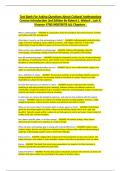Exam (elaborations)
Asking Questions About Cultural Anthropology Concise Introduction 2nd Edition By Robert L. Welsch , Luis A. Vivanco 9780190878078 ALL Chapters .
- Course
- Institution
- Book
Asking Questions About Cultural Anthropology Concise Introduction 2nd Edition By Robert L. Welsch , Luis A. Vivanco 9780190878078 ALL Chapters .
[Show more]



